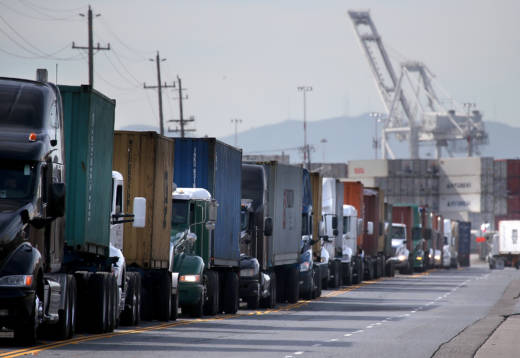SB 1 is also chock-full of provisions that environmentalists like, including substantial investments in public transit and for projects that will promote walking and bicycling.
But with the truck provision certain to become law, environmental groups sounded a bittersweet note about legislation that includes so much they agree with.
A handful of representative samples, by way of prepared statements:
From Amanda Eaken, director of the Natural Resources Defense Council’s transportation and climate program:
It took a lot of hard work to get this package across the finish line, and the transit, walking and biking investments will benefit millions of Californians. But legislators shouldn’t be forced to choose between much-needed transit investments and clean air -- especially in vulnerable communities. This package hands a windfall victory to dirty diesel and puts thousands of families at risk for asthma, cancers and other illnesses for decades to come. And this occurred because of a late-night, backroom deal where public health was traded for votes.
Californians expect more. People don’t need to suffer – and dirty diesel shouldn’t get a free pass – just to get the investments we need to fix our roads and improve clean transportation options.
From Joshua Stark, from transit advocacy group TransForm:
SB 1 will do some great things for California and our transportation system, and it breaks my heart that we couldn’t support it. We like that it sends a fair share of the money raised towards public transportation and safe walking and biking, but it also includes an unacceptable loophole to allow big trucks to keep polluting vulnerable communities. We couldn’t support a deal that sacrifices public health for public transportation — California needs both. ...
... We’re proud that a diverse coalition of more than 80 groups committed to environmental justice, climate protection, and sustainable transportation stood in solidarity throughout this process. Together we will keep fighting to reverse this “dirty trucking” policy and ensure that the communities most burdened by pollution from transportation benefit from the state’s investments in transportation.
***
Two other deals -- we don't know whether they were cut in back rooms or not -- proved instrumental to SB 1's passage.
Both involved persuading reluctant legislators -- a Democratic assemblywoman and senator from the Inland Empire , one Republican senator from the San Joaquin Valley -- to vote yes on the bill.
The details are embodied in SB 132.
The bill, yet to be passed, would direct $500 million for projects that will benefit the district of state Sen. Anthony Cannella, a Republican from the Stanislaus County town of Ceres. The legislation provides another $427 million for work in the area represented by Assemblywoman Sabrina Cervantes, D-Corona, and Sen. Richard Roth, D-Riverside.
The money for Merced-area projects includes $100 million for building a new road from UC Merced to Highway 99.
The rest of the cash -- $400 million -- would go to pay for expanding the Altamont Commuter Express (ACE) train service to Merced and Ceres. ACE currently runs from San Jose to Stockton.
“The ACE train is a big deal for me. It’s important for my district,” Cannella told the Los Angeles Times earlier this week.
“It’s a game-changer for my area,” he said. “If it's built, you can hop on a train and make your way to the Bay Area.”
As the Riverside Press-Enterprise reported, Cervantes was the target of a California Republican Party campaign to get her to vote no on SB 1.
But she and her fellow Democrat, Roth, agreed to vote for the package after striking an agreement for the state to restore vehicle-license fee revenue to several local communities and pay for several pending freeway, street and bridge projects.
In a joint statement, Roth and Cervantes said:
For too long, Sacramento has failed to provide Inland Southern California with the resources we deserve. Though this was a difficult vote, the cost of our region not getting its fair share is too high. That is why we went to the table to ensure Inland Southern California’s needs are represented with the vigor and dedication they deserve.
